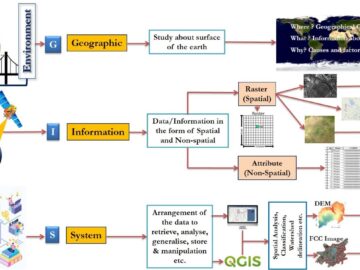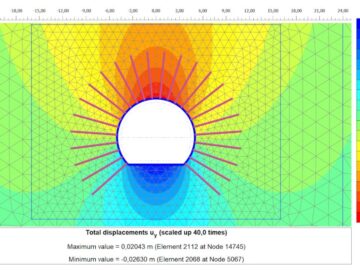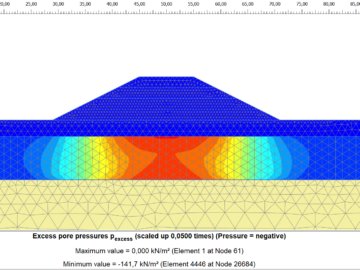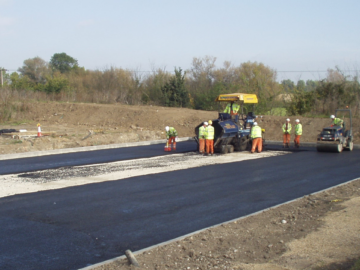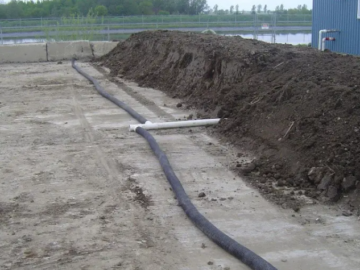Structures, geotecnical engineering, hydraulic engineering…Find the course you are looking for
-
- Reserve your place
- Civil Engineering, Environmental science, Geology, Upcoming
Disaster Risk Reduction and Climate resilience
- Introduction Although the number of casualties from natural disasters has gradually decreased in the past four decades, with decrease in the number of reported disasters in the past eight years,...
- Enroll now
-
-
- BIM, Civil Engineering, Environmental science, Geology, Software, Upcoming
QGIS for Earth Observation and Geospatial Applications
- Introduction The course “QGIS for Earth Observation and Geospatial Applications” is designed for land planners and hydrologists, professionals and students, those who want to gain skills in Earth Observation (EO)...
- Enroll now
-
- Geology, Mining, Software, Upcoming
Advanced Analytics in Mining Engineering
- Introduction Data analytics is no longer a luxury but viewed as a necessity for an industry generating trillions of dollars every year. There are many phases of the mining process...
- Enroll now
-
- Civil Engineering, Upcoming
Pavement Engineering and Management
- Introduction Dr. Vimy Henderson has significant experience providing pavement and materials engineering to agencies and clients throughout North America. She is also an Adjunct Professor and Lecturer in Pavement and...
- Enroll now
-
- Reserve your place
- Upcoming
Soil and groundwater remediation
- Introduction There are numerous contaminated sites all around the world where groundwater and/or soil has been contaminated as a result of industrial operations. Most governments in developed countries have developed...
- Enroll now
-
-
- Reserve your place
- Environmental science, Upcoming
Environmental Impact Assessment
- Introduction Nowadays most countries have an existing Environmental Impact Assessment (EIA) system in place. An EIA may be required for designated projects like the building of mines, roads, or dams....
- Enroll now
-
Civil Engineering
Civil engineering is the engineering discipline that addresses the built environment that we all use and rely upon every day but rarely give a second thought. From roads, sewer systems, and pipelines, to bridges, tunnels, and canals, to airports and railways, civil engineers are responsible for designing, building, and maintaining the structures that modern life depends on. It is safe to say that without the civil engineer, our daily lives would look dramatically different.
A unique feature of civil engineering is the necessity for a close public-private partnership. Many of the structures analyzed and built by civil engineers are directly or indirectly funded and controlled by governmental agencies, from road systems and bridges to sewer systems and pipelines. Because so many lives and livelihoods rely on these structures, a civil engineer’s primary focus is handling risk safely and cost-effectively.
Our courses are designed to teach a wide variety of material focused on the civil engineering world. From geotechnical, hydraulic, and seismic engineering and how they relate to civil engineering practice, to the specifics of soil, earthworks, structures, and even the unique software and programs used in the field, students will learn the information they need for success in civil engineering.
Structures
Much of civil engineering revolves around structures—like roads, bridges, and tunnels—and the materials used to construct them. Students will learn how to design and assess a wide variety of materials and structures in different contexts, focusing on practical, real-world examples. Our courses on structures and structural design focus on specialized topics, like prestressed concrete bridges or bored piles, to ensure that learners understand the necessary details. Some structure-related courses include:
– Introduction to the Design and Assessment of Prestressed Concrete Bridges
– AASHTO LRFD Bridge Design Specifications: Steel Structures
– AASHTO LRFD Bridge Design Specifications: Loads and General Information
– Structural Health Monitoring to Support Decision-Making in Civil Engineering
– Design and Construction of Large Diameter Foundation Bored Piles
– Fatigue of Aged Metallic Bridges
– Pile Design & Construction Practice
– Modelling, Analysis and Design of Concrete and Steel Structures Utilising SAP2000
– Structural Analysis – The Fundamentals towards Finite Element Analysis
Geotechnical Engineering
Geotechnical Engineering, sometimes called geotechnics, is the study of the behavior of the materials of the earth, specifically soil and rocks. Far from a straightforward analysis, geotechnics requires careful, computer-aided analysis to ensure that foundations are sturdy and buildings maintain their stability for the long term. For this reason, geotechnical engineering and civil engineering disciplines go hand in hand, and the prospective civil engineer gains valuable insight into the engineering process by delving into geotechnical topics. We offer a wide variety of geotechnical engineering courses; some of the geotechnical topics that most benefit a civil engineer include:
– Geotechnical Course using Oasys Software
– Geotechnical Site Investigations and Engineering Parameters for Geotechnical Design Analyses
– Computational Geotechnics using OptumG2/G3
– Geotechnical Foundation Analysis for Load Resistance Factor Design (LRFD)
– Probabilistic Analysis for Geotechnical and Civil Engineering
Hydraulic and Seismic Engineering
Water has long been a powerful challenge to the built environment, and much of the civil engineer’s job involves addressing the potential for harm that water—whether in floods or simple rainwater ingress—can cause to the project. Seismic activity like earthquakes offer another serious challenge to safe, effective build structures. Our courses teach the civil engineer to address these dangers and to mitigate the effects of climate change and natural disasters, whether the task is the retrofitting of existing structures or the design and construction of new ones. Some of our courses pertaining to hydraulic and seismic engineering include:
– Applied Hydrogeology
– Fundamentals of Hydrogeology
– Introduction to Hydrogeology and ArcGIS Applications
– Modeling Groundwater Chemistry with PHREEQC, PHAST and Python
– Seismic Assessment & Retrofitting of Existing RC Structures using SeismoStruct and SeismoBuild
– Earthquake Engineering for professionals
– Disaster Risk Reduction and Climate Resilience
Soil and Earthworks
Our civilization’s structures rest on the ground beneath our feet. Far from a simple concept, a proper understanding of the movement and mechanics of soil and earthworks is literally foundational to any well-built structure. From the effects of water to the movement of rocks and slopes over time, soil and rock mechanics are critical subjects for any prospective or practicing civil engineer. Our courses also address the ultimate earthworks projects, tunnels: how they are designed, excavated, and supported for safe and reliable functionality. Our soil and earthworks courses provide the framework upon which the rest of the field relies. Our classes include:
– Ground Modification and Soil Improvement
– Principles of Soil Mechanics
– Advanced Soil Mechanics
– Rock Mechanics
– Geosynthetics for Soil Reinforcement (GeoforSR)
– Applications of UDEC in Rock Slope Stability
– Tunnel Design with Plaxis
– Ground Support for Tunnels in Rock
– Introduction to the Mechanized Excavation of Tunnels via Tunnel Boring Machine
Software for Civil Engineering
Now more than ever, a modern civil engineer relies heavily on computer software to design and build safe and reliable structures. Software is a critical part of the engineering process at every stage of development: from initial analysis of a site and its geomechanics, to computer-aided design of the structure or project itself, to analysis of the project’s structures with specific stress analysis tools, to managing the project through construction and long-term maintenance. The effective civil engineer, therefore, must master the software designed for each phase of the project. We offer a large number of courses tailored to specific civil engineering software packages, designed to focus on a particular program and how it is used in the field. Whether you are interested in beginning a career in civil engineering, or are looking for information about software you’ve started to use in your daily practice, these courses are the perfect tutorial. Our civil engineering courses specifically focused on software include:
– AutoCAD Civil 3D for Civil Engineering
– MicroStation CONNECT Basics
– Revit Architecture
– Finite Element Analysis Using Abaqus Software
– A Guide to Workflows within Autodesk Infraworks
– Introduction to Offshore Structural Analysis and the Use of SACS
– Computational Geomechanics using CivilFEM
– Introduction to Pipe Stress Analysis and the use of CAESAR II
How Do Our Civil Engineering Classes Work?
We offer all our civil engineering courses through an 100% online virtual campus. Our professors are experts in their fields and present their material through a wide variety of engaging methods, from interactive coursework to video lectures. Many of the courses focus heavily on practical cases and worked examples, to demonstrate the critical equations and calculations of civil engineering in the real world. The focus of our courses, above all, is to equip and train students to apply their knowledge.
Each course is designed to be completed in a certain period of time, but all students have the freedom to review material at their own speed. We regularly update the content of our courses to ensure that the material taught meets the rigorous standards of modern civil engineering.
In our live videoconferences, teachers and students interact in real-time. We have also created a forum for each class, so that students and teachers can continue their engagement well after the class period has ended. Students also may email the teachers directly to receive help on a particularly troublesome problem. This system of peer-to-peer and teacher-student tutoring is one of our program’s most useful features, as it helps reinforce learning and ensures a well-rounded knowledge of the subject.
Finally, students have access to download all course materials, including video lectures and practical examples. Having these materials as reference will serve as a boon to new engineers or established professionals.
Do I Receive a Certification Upon the Completion of the Course?
Once the course is complete, students are administered an assessment to determine whether the student has successfully mastered the material. Each student who successfully completes the evaluation will be provided an academic certificate issued by Ingeoexpert confirming that the student has demonstrated proficiency. This certificate is secured by blockchain technology to prove to prospective employers and other academic institutions that it is authentic. This certificate can be downloaded and shared as the student wishes.
Learn More About our Courses
Our course pages offer much more information about the professor, the teaching methodology, course syllabus, and more. We focus on providing detailed courses that address specific and highly relevant civil engineering topics, and we have enlisted a team of skilled professionals to ensure that we can offer the most up-to-date information.
Whether you are already a professional looking for a refresher class, or a newcomer hoping to start a career in civil engineering, our courses offer you the content you need to succeed. Our goal is to provide our students with the best training by the best teachers, using our virtual campus to give our students the best opportunity for education.


